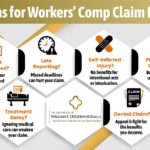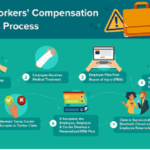Back pain is one of the leading reasons people miss work, and when it strikes on the job, it can put your health, income, and career at risk. Yet proving a back injury is job-related isn’t always as simple as saying “it happened at work.” Employers and insurance providers often look for reasons to deny or minimize claims. That’s where understanding the causes – and having the right legal backup – makes all the difference in reducing delays or disputes in claims.
The Hidden Toll of Back Injuries on the Job
Back injuries don’t always come from dramatic accidents. Sometimes they build up quietly over time until one wrong move pushes things over the edge.
Common Causes You Might Not Expect
When people imagine back injuries at work, they usually picture someone lifting something too heavy and suddenly falling to the floor in pain. While that’s certainly one scenario, there are many ways a back injury can sneak up on you during the workday.
- Repetitive movements: Doing the same motion for hours a day, like bending, twisting, or even standing in place, can slowly strain your back muscles and spine.
- Poor ergonomics: Sitting at a poorly adjusted desk or using equipment that forces awkward postures can put serious stress on your lower back.
- Slips and falls: Wet floors, uneven surfaces, and cluttered hallways often lead to sudden movements that can twist the spine or cause serious strain.
- Heavy lifting: Whether you’re moving boxes or transferring patients, lifting without proper technique is one of the most common ways people injure their backs.
- Vehicle accidents: Driving as part of your job? Back injuries from delivery van crashes or other work-related vehicle incidents are often covered under workers’ comp.
Fun fact: Back injuries are among the most expensive workplace injuries. According to OSHA, they account for nearly 20% of all workplace injury claims and cost billions in medical care and lost productivity each year.
Proving It’s Work-Related: More Than Just Saying “Ouch”
Just because your back hurts and you were at work when it started doesn’t automatically mean your claim will be approved. Insurance adjusters are trained to look for ways to dispute or delay payments, especially for injuries that don’t involve broken bones or visible damage.
What Workers’ Compensation Lawyers Recommend
If you’re planning to file a workers’ comp claim for a back injury, legal experts will tell you: what you do in the first 24–48 hours can make or break your case.
Document the incident immediately. Make sure to report your injury to a supervisor right away, even if the pain seems minor at first. Delays can raise doubts about where and how the injury really happened.
Get medical attention from an approved provider. Some states require that you see a specific doctor or use an employer-approved list. If you go to your own doctor without checking first, it could hurt your case.
Describe your symptoms clearly and consistently. Whether you’re talking to your boss, HR, or your doctor, your story should match. Workers’ compensation lawyers often see cases fall apart simply because the injured worker gave conflicting accounts.
Collect supporting evidence. This might include photos of the area where the injury occurred, video footage if available, witness statements, or records showing you had no previous back issues.
Hire a workers’ comp attorney early. Don’t wait until your claim is denied. An experienced lawyer at Golden State Workers Compensation can guide you from the start, helping you avoid common traps and making sure your documentation is airtight.
Don’t Ignore the Early Signs
One of the biggest mistakes people make with back injuries is brushing off early symptoms. That dull ache after your shift might be your body’s way of waving a red flag. Ignoring it and pushing through could turn a small issue into a lifelong problem.
Don’t Fight This Battle Alone
Whether your injury came from a single moment or years of wear and tear, proving that it’s work-related is not always easy. Employers and insurance companies often push back hard, hoping you’ll give up. But with the right documentation, medical support, and legal representation, you can stand your ground.
Workers’ compensation lawyers know exactly how to frame your case, what paperwork matters most, and how to deal with stubborn insurance adjusters. If your back is paying the price for your job, you deserve to be heard – and helped.














